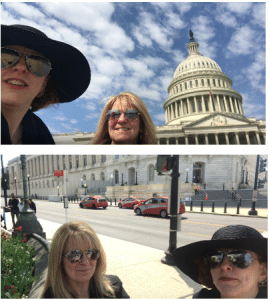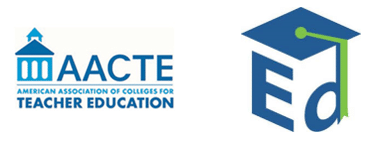29 Apr2019
By Linda Minor

Being new to AACTE, I learned a lot about what to expect during Day on the Hill when Deborah Koolbeck and I recently went to the Capitol. I have never been on the Capitol grounds before, although I have lived in the DC area for over 20 years, and it is beautiful. The weather was perfect. View video clip about Capitol Grounds.
So, what can you expect during Day on the Hill? Tuesday will be a full-day of orientation at the hotel where you will build skills and prepare for their meetings with your congressional offices. Then, on Wednesday morning you will be bused to Capitol Hill for scheduled appointments with your elected officials. “But what about their luggage,” I asked? Attendees can bring luggage on the bus to the hill—or you can stay in town a little longer and take advantage of all the activities DC has to offer. View video clip about luggage.
29 Apr2019
By Ward Cummings
 In anticipation of Washington Week’s Day on the Hill, AACTE’s premier advocacy event, members of the Committee on Government Relations and Advocacy hosted a webinar on Thursday, April 18 to answer questions about the event. How to schedule a congressional meeting, how to develop an advocacy message, and how to walk into a U.S. Senator’s office with confidence, are just samples of the many issues discussed during the webinar. The recorded webinar, Are You Ready for a Day on the Hill? is now available to watch on the AACTE website.
In anticipation of Washington Week’s Day on the Hill, AACTE’s premier advocacy event, members of the Committee on Government Relations and Advocacy hosted a webinar on Thursday, April 18 to answer questions about the event. How to schedule a congressional meeting, how to develop an advocacy message, and how to walk into a U.S. Senator’s office with confidence, are just samples of the many issues discussed during the webinar. The recorded webinar, Are You Ready for a Day on the Hill? is now available to watch on the AACTE website.
During the webinar, an experienced panel of experts shared their personal stories and provided guidance on the methods and reasons for advocacy. Additionally, they explained what attendees at this year’s Washington Week in the nation’s capital can expect when they attend Day on the Hill events.
Webinar attendees were instructed on what things to arrange prior to traveling, who to involve from their institution, how to request an appointment with their legislator, and how to prepare for the meeting. It was a one-stop-shop for all things related to the event.
29 Apr2019
By Michael Maher

What does it mean to be a leader? Are leaders born or are they developed?
If you Google the word “Leader,” depending on the day, you may end up with between 4 and 6 billion hits. There is certainly no shortage of opinions, courses, or books on leadership. Some individuals are leaders by virtue of their title, others are considered leaders whether or not they have a title. Whether leadership has been thrust upon you or it has slowly developed over time, you understand that leadership carries the challenge of expectations and obligations.
As a person who thinks about the concept of leadership quite a bit, it seems to me that, although some individuals may embody characteristics that lend themselves to leadership, true leaders are developed over time through a combination of professional development and lived experience.
As a leader you have an obligation to those you lead, an obligation to the profession, and an obligation to yourself. In the field of education, and in teacher preparation in particular, there are no shortage of leaders. Those who are the most impactful, however, are the ones who continuously seek to improve their knowledge, skills, and relationships.
19 Apr2019
By Deborah Koolbeck

The AACTE Federal Update Webinars are back! As April has unfolded, quite a few things have started to bloom and grow in Washington, DC, including the budget and appropriations process. The President’s Fiscal Year 2020 Budget Request was released and the Congress is in full appropriations season. But will the caps on defense and non-defense discretionary funds be raised to avoid deep cuts in programs? What is unfolding with legislation, including the Higher Education Act reauthorization?
We will cover this and more during the AACTE April 2019 Federal Update webinar. Remember there is always time to get your questions answered, and the webinar will be recorded and posted on the AACTE Advocacy Center federal page.
Register Today:
Tuesday, April 23 5:00 – 6:00 p.m. EDT
Wednesday, April 24, 11:00 a.m. – 12:00 noon EDT
12 Apr2019
By Jane E. West
This blog post is written by AACTE consultant Jane West and is intended to provide update information. The views expressed in this post do not necessarily reflect the views of AACTE.
Congress was busy this week trying to wrap a few things up as they enter an extended recess period. With the timeline for the election pressing, the momentum will continue. Remember the first Democratic presidential candidate debate is in June—just two months away! So the pressure is on.
- House Makes Magic Move on Budget!
The Budget Control Act, as it stands now, would require dramatic cuts for education and other programs for FY 2020, which begins October 1. In order to avoid significant cuts to education and other programs, the Budget Control Act needs to be amended to increase the spending caps. While the House Budget Committee adopted new spending caps this week, Democrats were unable to find consensus and bring that provision to the House floor.
But do not despair! Where there is a will there is a way! On Wednesday the House adopted something called a “deeming resolution” which provides for $1.3 trillion for the 12 spending bills in FY 2020. The “non-defense discretionary” portion (which includes education) will be $34 billion over the FY 2019 spending level. This deeming resolution paves the way for Appropriations Chair, Rep. Nita Lowey (D-NY), to divvy up the funding into 12 pots—one for each of the appropriations bills.
05 Apr2019
By Deborah Koolbeck

The U.S. Department of Education has released its Notice of Inviting Applications for the Fiscal Year 2019 Teacher Quality Partnership (TQP) Grants in the Federal Register. TQP is the only federal initiative dedicated to strengthening and transforming educator preparation at institutions of higher education and to meet the workforce needs of high need school districts and schools.
02 Apr2019
By Jerrica Thurman
 AACTE is excited to announce registration is open for its 2019 Washington Week. This signature event is held annually in the nation’s capital, with participation from AACTE and the Association of Teacher Educators (ATE) state chapter leaders, Holmes Scholars, and AACTE members and non-members alike interested in advocating for the profession. Under the theme “Your Voice Matters,” this year’s Washington Week will be held June 2-5 at the Renaissance Arlington Capital View Hotel in Arlington, VA, and on Capitol Hill.
AACTE is excited to announce registration is open for its 2019 Washington Week. This signature event is held annually in the nation’s capital, with participation from AACTE and the Association of Teacher Educators (ATE) state chapter leaders, Holmes Scholars, and AACTE members and non-members alike interested in advocating for the profession. Under the theme “Your Voice Matters,” this year’s Washington Week will be held June 2-5 at the Renaissance Arlington Capital View Hotel in Arlington, VA, and on Capitol Hill.
07 Feb2019
By Jerrica Thurman
 The members of the Learning First Alliance (LFA) will host Public Schools Week, March 25-29, 2019, to show the great things happening every day in public schools–and show the potential for greater things.
The members of the Learning First Alliance (LFA) will host Public Schools Week, March 25-29, 2019, to show the great things happening every day in public schools–and show the potential for greater things.
This second annual event encourages school leaders to invite community members, lawmakers, parents and others to visit and see the wide array of programs and high-quality opportunities offered, honor students’ accomplishments and see the joys and challenges of teaching and learning in public schools.
“Public education is the foundation for students’ success, the growth of communities, and our nation’s future,” said Nathan R. Monell, CAE, executive director of the National PTA and 2018-19 chair of the Learning First Alliance, a coalition of 12 national education organizations representing more than 10 million parents, teachers, administrators, specialists, school board members and teacher educators. “Public schools educate 90 percent of our nation’s students and are providing talented professionals for jobs in the corporate and public sectors as well as the military. It’s vitally important that we have a strong system of public schools across the United States.”
05 Feb2019
By Deborah Koolbeck
As the U.S. Department of Education is engaging in negotiated rulemaking on the TEACH grants, the Department announced that it is opening a process for reconsideration of conversion. TEACH grant recipients study to teach in a high-need field and commit to teaching in a high-need school in their chosen field for 4 years. Recipients have an 8-year window in which to complete these 4 years of service. If a TEACH grant recipient does not complete this service, the grant funds received convert to Direct Unsubsidized Federal Loan. For those TEACH grant recipients whose grant(s) were converted to loan(s) and who met or are meeting the TEACH grant service requirements, a reconsideration can be requested.
The Department shares the following on its webpage:
If you met or are meeting the TEACH Grant service requirements within the eight-year service obligation period, but had your grants converted to loans because you did not comply with the annual certification requirement, you can request reconsideration of those conversions.
11 Jan2019
By Deborah Koolbeck
 As you prepare for AACTE’s Annual Meeting, I would like to highlight a new opportunity for attendees— an advocacy preconference! Preconferences happen on Thursday, February 21, and this one is scheduled from 1 p.m. to 5 p.m. Join members of the AACTE Committee on Government Relations and Advocacy as well as other colleagues in the field for “A Return to Discourse: A Foundation for Effective Advocacy.”
As you prepare for AACTE’s Annual Meeting, I would like to highlight a new opportunity for attendees— an advocacy preconference! Preconferences happen on Thursday, February 21, and this one is scheduled from 1 p.m. to 5 p.m. Join members of the AACTE Committee on Government Relations and Advocacy as well as other colleagues in the field for “A Return to Discourse: A Foundation for Effective Advocacy.”
11 Jan2019
By Deborah Koolbeck
 Early last month, the Institute of Education Sciences (IES) National Center for Education Statistics released its “First Look” at the Integrated Postsecondary Education Data System (IPEDS) winter 2017-18 data collection. This includes fully edited and imputed data and four survey components: graduation rates for selected cohorts 2009-14, outcome measures for cohort year 2009-10, student financial aid data for the academic year 2016-17, as well as admissions for fall 2017.
Early last month, the Institute of Education Sciences (IES) National Center for Education Statistics released its “First Look” at the Integrated Postsecondary Education Data System (IPEDS) winter 2017-18 data collection. This includes fully edited and imputed data and four survey components: graduation rates for selected cohorts 2009-14, outcome measures for cohort year 2009-10, student financial aid data for the academic year 2016-17, as well as admissions for fall 2017.
Would you like to learn about or receive other releases from IES and its component centers and regional labs? Sign up for email updates from the U.S. Department of Education. Once registered, you have the option to manage your preferences to receive only those newsletters and updates that will serve you. Similarly, you can sign up to receive updates at your state level to stay abreast of your state’s Department of Education.
08 Jan2019
By Deborah Koolbeck
 The U.S. Department of Education (Department) is moving forward with negotiated rulemaking around a large number of issues dealing with federal student financial aid in the Higher Education Act, commonly known as “Title IV,” and AACTE will be at the table. Last fall, the Department put out a call for nominations for negotiators to be part of a full committee and three subcommittees, and this week announced the list of negotiators, which includes 18 AACTE member institutions.
The U.S. Department of Education (Department) is moving forward with negotiated rulemaking around a large number of issues dealing with federal student financial aid in the Higher Education Act, commonly known as “Title IV,” and AACTE will be at the table. Last fall, the Department put out a call for nominations for negotiators to be part of a full committee and three subcommittees, and this week announced the list of negotiators, which includes 18 AACTE member institutions.
The full committee will cover issues around accreditation and innovation, and the subcommittees will advise the full committee on the following issues: faith-based entities, distance learning, and TEACH grants. The first committee and subcommittees sessions will take place next week, January 14–18.
In addition to AACTE member participation, I will be representing the Association and its members on the TEACH grant subcommittee. Negotiators also include a number of AACTE partners. To see the full list of negotiators for the full committee and each of the subcommittees, along with the supporting materials, visit the U.S. Department of Education website.
Would you like to learn more about the law that establishes the processes around negotiated rulemaking? Review the Negotiated Rulemaking Act of 1990, or read a five-page summary of the negotiated rulemaking process.
04 Jan2019
By Imani Stephens
This article and photo originally appeared on Cronkite News and is reprinted with permission.
 A record 1,800 teachers were on ballots across the country this fall, and the National Education Association estimates that as many as 1,100 of them won their races.
A record 1,800 teachers were on ballots across the country this fall, and the National Education Association estimates that as many as 1,100 of them won their races.
Not a perfect score, but good enough for educators to boast that what they have been calling the Year of the Teacher could be just the first of many such years.
“Educators stepped out of their classrooms and into the public realm to run for the legislature and they did it fearlessly, and they did it in a way that made all us proud of them,” said Joe Thomas, Arizona Education Association president.
03 Jan2019
By Jerrica Thurman

AACTE and fellow members of the Learning First Alliance issued a joint statement on December 19, 2018 that emphasizes the Federal School Safety Commission should help schools provide mental health resources to prevent violence. LFA members said the federal government should focus its next steps on resources and training more mental health specialists to ensure safety of students and school staff:
A new federal report misses a high-profile opportunity to bring leadership and resources to social-emotional and mental health needs in K-12 schools, the Learning First Alliance, a coalition of 12 major national education organizations that represents 10 million parents, teachers, administrators, school counselors, specialists, teacher educators, and school board members, stated in response to recommendations by the federal Commission on School Safety, led by U.S. Secretary of Education Betsy DeVos. Simply talking about the need for something to be done without creating the ability for schools to have the tools to reach more students in need avoids a core responsibility.
03 Jan2019
By AACTE
AACTE President/CEO Lynn M. Gangone issued the following statement on December 20, 2018 regarding the latest Federal School Safety Commission report:
On December 18, 2018, the Federal School Safety Commission released its final report, outlining the background of its work and providing recommendations for action across three broad areas: 1) prevent, 2) protect and mitigate, and 3) respond and recover. While AACTE appreciates the effort of the current Administration to explore the critical issue of school safety, the report raises significant concerns and poses further questions.
The Commission’s report talks about the social-emotional and mental health needs of our K-12 students; however, it does not address capacity building for schools to have the tools to reach more students. The recommendation to rescind the current guidance on school discipline, created to combat the disproportionate suspension and expulsion of students of color, students with disabilities, and LGBTQ youth, is also highly problematic and contrary to our Association’s values of equity and inclusion. AACTE President and CEO Lynn M. Gangone testified before the Commission and joined others in strongly discouraging the use of federal funds to arm teachers as a solution to ensure school safety, yet the report does not eliminate the option of training and arming school personnel with firearms.








 In anticipation of Washington Week’s Day on the Hill, AACTE’s premier advocacy event, members of the Committee on Government Relations and Advocacy hosted a webinar on Thursday, April 18 to answer questions about the event. How to schedule a congressional meeting, how to develop an advocacy message, and how to walk into a U.S. Senator’s office with confidence, are just samples of the many issues discussed during the webinar. The recorded webinar, Are You Ready for a Day on the Hill? is now available to watch on the AACTE website.
In anticipation of Washington Week’s Day on the Hill, AACTE’s premier advocacy event, members of the Committee on Government Relations and Advocacy hosted a webinar on Thursday, April 18 to answer questions about the event. How to schedule a congressional meeting, how to develop an advocacy message, and how to walk into a U.S. Senator’s office with confidence, are just samples of the many issues discussed during the webinar. The recorded webinar, Are You Ready for a Day on the Hill? is now available to watch on the AACTE website. 



 The members of the
The members of the  As you prepare for AACTE’s Annual Meeting, I would like to highlight a new opportunity for attendees— an advocacy preconference! Preconferences happen on Thursday, February 21, and this one is scheduled from 1 p.m. to 5 p.m. Join members of the AACTE Committee on Government Relations and Advocacy as well as other colleagues in the field for “A Return to Discourse: A Foundation for Effective Advocacy.”
As you prepare for AACTE’s Annual Meeting, I would like to highlight a new opportunity for attendees— an advocacy preconference! Preconferences happen on Thursday, February 21, and this one is scheduled from 1 p.m. to 5 p.m. Join members of the AACTE Committee on Government Relations and Advocacy as well as other colleagues in the field for “A Return to Discourse: A Foundation for Effective Advocacy.” Early last month, the Institute of Education Sciences (IES) National Center for Education Statistics released its “
Early last month, the Institute of Education Sciences (IES) National Center for Education Statistics released its “ The U.S. Department of Education (Department) is moving forward with negotiated rulemaking around a large number of issues dealing with federal student financial aid in the Higher Education Act, commonly known as “Title IV,” and AACTE will be at the table. Last fall, the Department put out a call for nominations for negotiators to be part of a full committee and three subcommittees, and this week announced the list of negotiators, which includes 18 AACTE member institutions.
The U.S. Department of Education (Department) is moving forward with negotiated rulemaking around a large number of issues dealing with federal student financial aid in the Higher Education Act, commonly known as “Title IV,” and AACTE will be at the table. Last fall, the Department put out a call for nominations for negotiators to be part of a full committee and three subcommittees, and this week announced the list of negotiators, which includes 18 AACTE member institutions. A record 1,800 teachers were on ballots across the country this fall, and the National Education Association estimates that as many as 1,100 of them won their races.
A record 1,800 teachers were on ballots across the country this fall, and the National Education Association estimates that as many as 1,100 of them won their races. 